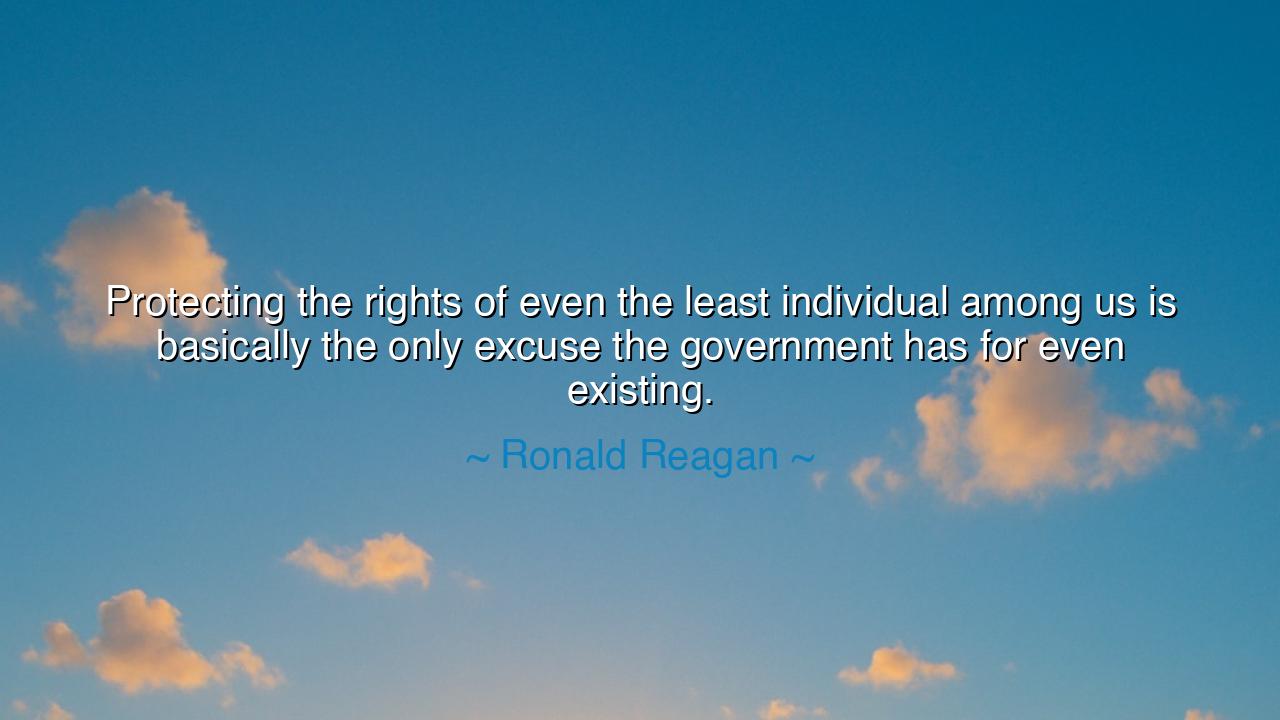
Protecting the rights of even the least individual among us is
Protecting the rights of even the least individual among us is basically the only excuse the government has for even existing.






The words of Ronald Reagan, spoken with the conviction of a man who understood the delicate balance between liberty and power, resound through the ages: “Protecting the rights of even the least individual among us is basically the only excuse the government has for even existing.” In this declaration lies the heartbeat of the American spirit, and indeed, the eternal principle of all just governance — that power exists not to rule, but to serve; not to dominate, but to protect the dignity of the individual. Reagan’s words remind us that government is not the master of the people, but their guardian, and that when it forgets this sacred duty, it forfeits its moral right to command obedience.
To understand the meaning of this quote, one must begin with the foundation upon which it stands — the belief that every person, no matter how humble or voiceless, is endowed with natural rights that precede the state. These are not privileges granted by rulers, but truths written into the human soul: the right to life, liberty, and the pursuit of happiness. The greatness of a government, therefore, is not measured by its size, wealth, or might, but by how faithfully it safeguards those rights for all — especially for the weak, the marginalized, and the forgotten. Reagan’s words are a rebuke to arrogance in power and a reminder that the first and last justification for authority is the defense of freedom.
The origin of this belief lies deep in the soil of history, older than Reagan, older even than the republic he served. From the Magna Carta to the Declaration of Independence, mankind’s long struggle against tyranny has been guided by one truth: that the state is a servant of the people, not their master. The Founders of America built their new nation on this ideal, declaring that government derives “its just powers from the consent of the governed.” Reagan, standing centuries later, simply rekindled that flame — reminding his generation that liberty is not self-sustaining. Every government, no matter how noble its beginning, must be constantly reminded that its only moral purpose is the protection of the individual.
History has repeatedly shown what happens when governments forget this sacred duty. Consider the dark days of Nazi Germany, when the state, instead of protecting the rights of the individual, became the instrument of their destruction. Laws were twisted to justify murder, and obedience replaced conscience. Six million Jews and countless others — the least among humanity — were stripped of their rights, their names, their lives. The world learned a terrible truth: when a government ceases to defend the individual, it becomes the enemy of mankind itself. Reagan’s warning thus carries the weight of history — a solemn call to ensure that freedom is never again betrayed by the very institutions meant to preserve it.
And yet, Reagan’s statement is not one of despair, but of moral clarity and hope. He believed that a government rooted in liberty could be a force for good — not through control, but through restraint. The state must act as the shield, not the sword; as the guardian of peace, not the architect of dependency. When power grows too comfortable, when it seeks to manage every detail of life, it forgets its divine purpose. A free society thrives when its citizens stand tall, self-reliant, and secure in their God-given rights, not when they bow before bureaucracy. Thus, Reagan’s vision was not of anarchic freedom, but of ordered liberty — where government protects, and the people create.
The lesson of this quote is both profound and practical: liberty must always flow from the bottom up, never from the top down. When the government forgets the individual, it becomes a machine of oppression; but when the people forget their own responsibility, they invite that oppression in. Every citizen, therefore, bears a share of the sacred duty to defend the rights of others — not only their own. For the freedom of one is the freedom of all, and the violation of one soul’s rights is the seed of tyranny for the rest. A just nation begins not with rulers who demand obedience, but with citizens who demand accountability.
And so, my child, take this wisdom to heart. Never surrender your conscience to power, nor allow the cries of the least among you to go unheard. Hold your government to its true purpose — to protect, not to plunder; to serve, not to subdue. Remember always that the measure of a nation is found not in its monuments or armies, but in its mercy — in how it guards the smallest flame of human freedom. When you defend the rights of even the least individual, you defend the very soul of liberty itself. For this, and this alone, is the rightful excuse for government to exist — the preservation of the sacred dignity of man, made free by his Creator and defended by those who dare to remember.






AAdministratorAdministrator
Welcome, honored guests. Please leave a comment, we will respond soon